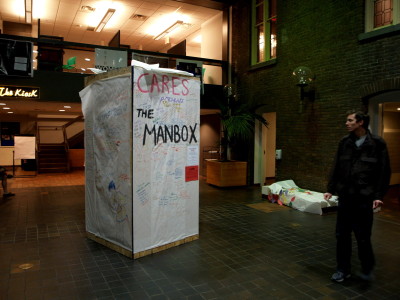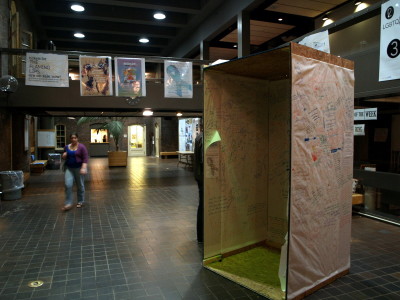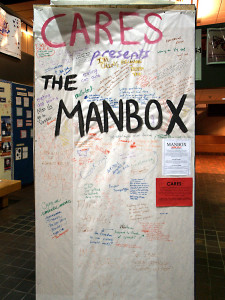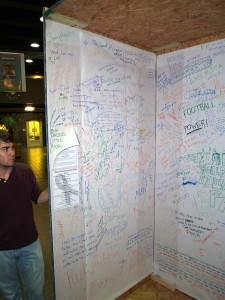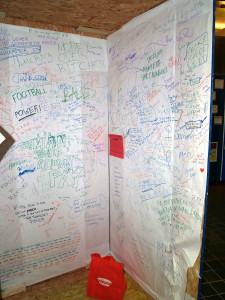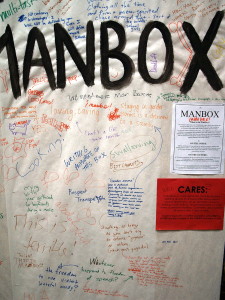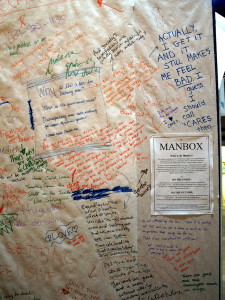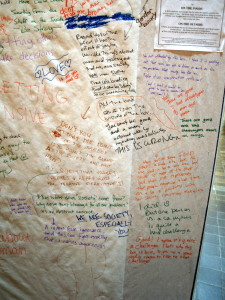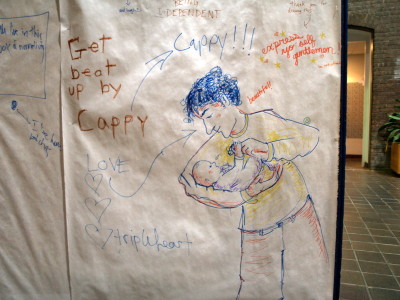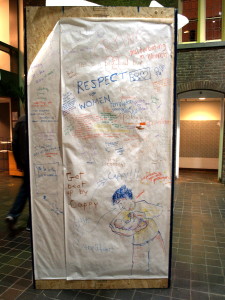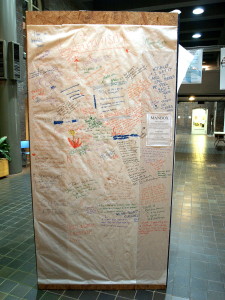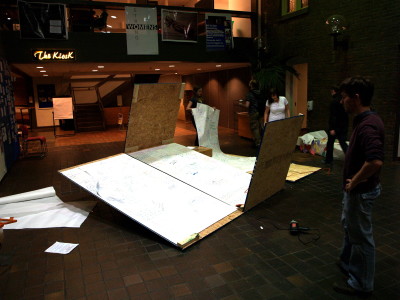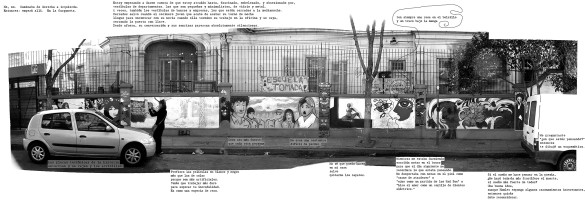As I was eating my breakfast cereal I heard the thudding and rustling of loaded horses galloping through the bushes to stop in our backyard where my father was gardening. My spoon hovered high above my bowl, brimming with wheaty stars floating in their lake of milk. Peering over the spoon I could see my stepmother’s pregnant belly shuffle around the kitchen.
Moments later my father came in the backdoor, his face hidden in stubble and spectacles.
“How is everything going sweetie?” my stepmother asked, painting croûtons with garlic at the counter with her back to him.
“There are a lot of weeds. I’m going to be out there all day.” He rubbed his face with the back of one wrist.
She turned around with her little brush in one hand and a croûton in the other.
“Oh Nick, look, you’re getting dirt everywhere!” she complained, as he took his gloves off and the dirt caked on them crumbled to the floor. She popped the croûton into her mouth. “Also take your shoes off before you come in from the garden.”
“Paul,” my father shouted up the stairs as she returned to her croûtons, “Could you come out back for a bit?” He walked over to the sink to get a glass of water.
I heard a muffled response followed by unevenly rhythmic footsteps coming down the stairs. The gangly, large-headed Paul entered the kitchen with a wifebeater clinging to his hairy shoulders. Paul was a friend of my dad’s visiting for the week; whoever was on the horses in the backyard must have wanted to see him.
“Sure,” he said, “it’ll be nice to get some fresh air.”
“Here,” my father said, gesturing out into the backyard, “come on out.”
“Honey, are you going to plant my gladioli while you’re out there?” she shouted to my father after he was out the door.
“What?” yelled back my father.
“Paul, can you ask Nick to make sure he makes time to plant my gladioli?” she called.
“Of course, Phoebe” Paul, at the doorway, returned.
I tilted my spoon slightly and milk wrapped around the edge, dripping off the bottom into the bowl. My stepmom put a tray of croûtons in the oven and busied herself with organizing a gazpacho, occasionally stopping to hold her abdomen (a girl) with one hand. I remained immobile at the table in the middle of the kitchen. Tilting the spoon more I watched each piece of cereal march fatally off its ledge into the bottomless cereal bowl like lemmings. My stepmother opened a window and warm May morning wafted through the white kitchen in the cross-breeze from the open back door. The breeze brought murmurings in from the backyard that seemed almost like intonations of some ceremony. I ate my cereal at a rate of about one soggy spoonful per minute and decided it might not be a ceremony, it could be Paul initiating a treaty with traders on horseback from far away.
Phoebe, with a groan, always groaning, walked over to the kitchen table to sit down. She leaned on her arms and let out a sigh. I watched the birds dancing in the tree outside the window behind her.
“Eat your cereal, Jacob, you’ve been sitting there for an hour. You promised you’d help your dad in garden later,” Phoebe informed me eventually, sliding her head towards the table running her hands through her straight brown hair.
“Mmm,” I replied, and picked up the bowl to slurp milk loudly. Phoebe got up again and began to put a salad together. From the backyard I heard a horse galloping away and moments later Paul walked into the kitchen, hunched and bony, over to the sink to wash his hands.
“What did they need you out there for an hour, Paul?” I asked.
“Oh, just doing some digging. Nick’s doing a great job with the weeds,” he said. “Still working on that cereal?” he asked me with a grin.
“Mmm,” I said, pushing my spoon slowly into the milk until it suddenly flooded.
After I finished my cereal and finished reading the back of the cereal box, I put the bowl in the sink and the box away and sat back down with my book. I read about anthropomorphic rodents defending a monastery and my stepmother looked through a giant pile of mail after clearing up. I leaned my chin on the table and held the book with my arms outstretched.
“Phebe! Look at this!” yelled my dad from outside, a little later.
“What?” yelled my stepmother.
He entered with dirt on his forearms, holding a muddy mass in one hand.
“Look at this,” he said. Over my book I tried see what he had brought in. My stepmother bustled to the closet to get the dust buster.
“Nick, you’re getting dirt everywhere,” she complained.
“Look at this, Jacob,” he exclaimed to me, ignoring his wife. “Looks like some old glove made of metal or something, what do you think it was doing buried with the weeds in the garden?”
“Mmr-o-noh,” I said, with my chin still on the table.
“You don’t know? Neither do I, hey come outside, you can’t stay in all day, there’s some more stuff buried out there I think.”
“Okay,” I said, putting my book down, ready to unearth a trove of ancient armor. I tripped over a crib packaged in a cardboard box near the table. We walked outside with my stepmom dust busting the floor behind us.
My dad had found some kind of glove. I imagined the glove crawling though the dirt and pulling up all my stepmom’s gladioli, chewing them up in its fingers.
Amongst the wreckage of weeds and overturned dirt there was one enormous, thick and prickly weed, the roots of which had torn a giant clump from the earth. In the hole left behind you could see something that was once shiny but now dark and covered in mud. A little further, where the trees in our backyard began to congregate, I could see the hoofprints and broken branches left behind by the horses I heard earlier. My dad was tugging at the thing in the ground.
“Dad, what was the horseman doing with Paul?” I asked.
He paused and looked up at me.
“The horseman that was here before,” I reminded him.
“Oh, yeah, I’m not sure, Jacob. Look here, why don’t you get the big shovel and we can try and lever this thing out.”
I brought the shovel and with skinny elbows pushed it into thick earth just under the edge of the shiny object and jumped onto the blade with both feet to drive it in. As I leaned backward on the handle and he tugged, a large muddy lump as big as me burst free of the earth and I fell onto the weeds.
My father held it up in his two grimy gloves in wonderment. He started patting it slowly and hunks of earth fell crumbling, and then thick chunks of dirt and white tumbled out from inside it. It looked like a long vest covered in lumps and knobs and strips, but it was hard to see so caked in grit. He placed it gently down on the ground.
“It looks like some old piece of armor! Jacob, you remember in the museum the part with the Chinese warriors? Like those.”
I remembered horsemen firing bows and arrows at each other, and nomads with all the camels making cheese. “Maybe the man on the horse left it behind after talking to Paul?” I ventured.
“I don’t know, it must be a replica but—” brushing dirt away from what appeared to be the shoulder he looked at very closely, “—it does look very old.”
My dad studied Asian history, so he would know if the armor was old, or why a man would bury his armor after talking with Paul.
“How weird to find this in the backyard,” he continued. “Why on earth would anyone bury a replica of a suit of armor here? Look, it seems like there’s more.” I looked and there were more pieces buried in the earth.
“What’s this?” I asked, picking up one of the oblong chunks that had fallen out from inside the vest. It was pale under the dirt.
“That looks like a bone,” my dad said to me. “We’re going to dig this all up.”
I noticed then that amongst the trees, some fifty feet away where the shrubs overtook grass and the land sloped downward to a ravine, there was a man sitting with his head on his raised knees. Next to him a light brown horse lay as if dead on the ground.
I headed towards the man slowly, stopping every few paces to see if he had seen me. He was dressed in a loose brown robe that was huge at the wrists and was tied around his waist with a white sash. As I neared he looked up at me with his wide and weary face. He was Asian, and had a thin moustache and receding hair on his recently shaved head. He cast his eyes downward again.
“Mister?” I asked, standing a little ways from him.
“Good day,” he said.
“Is your horse okay?”
He turned to his horse and rested his hand on the horse’s flank. The animal’s skin was stretched tautly over its ribs and the top of its leg, too, jutted out awkwardly. I could see its side rise shakily as it breathed. Its mouth and eyes were open but blank and its nostrils quivered with each exhalation. A saddle with some bags had been cast to the side next to a sword and bow.
“She’ll be dead in the morning,” he declared. “We wore her out. It was a long journey.”
“What journey, where did you come from?” I asked. “And weren’t there more horses, and why did you want to see Paul?”
“Paul is a friend of yours?”
“He’s a friend of my dad’s,” I responded, turning to wave at my dad, who waved back, amused.
“Your father too must be a good man.”
“Why did you want to see Paul?” I asked again.
“I thought you wanted to know where I came from,” he answered, with a smile that still left sadness on his hard face.
“Yeah,” I said. “What’s your name?”
“Ochir Khan.”
“Are you like Genghis Khan?” I proposed.
“You know a lot,” he said, smiling more fully. “Yes, like Chingis Khan. I led our armies against neighbors from the red west. But two months ago I learned that our enemy had raided the camp where my family was and hurt my wife and children.”
“Did you save them?” I turned to look at my dad who had taken up the shovel and was gingerly poking around in the dirt with it.
“I left to return home, but…” he turned to look at his horse. “My three children were all hurt and two were very sick. I knew I had to find a shaman to help, someone like your father’s friend.”
“Could he help?”
“My son was too sick. We buried him with the blessings of spirits. In my armor, because he was going to be a general one day, and my armor was no longer of use. I’m sure my army has scattered by now. I only kept this gauntlet,” he held up his hand “to remember him by.”
I finally approached him and sat down on the stump of a dead tree nearby. I noticed streaks through the dirt on his face.
“Unfortunately Paul couldn’t help my two daughters. My youngest daughter, only a baby, is gravely ill and we sent her with my oldest child to seek an wise man named Chagan Enq. He lives in a small village high in the clouds called Rasa that’s several day’s journey from here by horse and boat, in the mountains to the North. This horse is too sick to make the trip and I knew that their horse would travel faster and live longer without having to carry my weight, too.”
“They went off by themselves?” I asked, incredulous. “How old is she, the older girl?”
“She is just older than you; she has been with us 14 years. But she’s a tough girl. I wouldn’t have sent her without Paul’s blessing. He whispered instructions to their horse so that he will know where to take them.”
We dug out a whole suit of armor in our backyard, helmet boots and everything, but it was missing one glove. There was a complete skeleton of a human child in there too. While my dad was talking to the police on the phone about something I went outside and took the one gauntlet. Under the faucet by the deck I cleaned it until the black leather was black again and the metal strips above the knuckles shone. I tried it on – it was giant on me and the huge black studded plate at the back of it extended halfway to my elbow. It was so stiff I couldn’t move my fingers inside it, and it was heavy too.
“–over tomorrow, then, you could have a look at it all? I’m still digging it all out,” I heard my dad say on the phone in the kitchen as I walked in wearing the gauntlet and still trying to bend my fingers. Phoebe was standing at the Formica island reading a brochure, and behind her back I picked up a catalog of baby accessories that was on the pile of mail and dropped it in the trash. I grabbed my book from the table.
“Yeah, we’re definitely interested, please let Jameson with Asian Peoples know I’m coming,” continued my dad. I walked up the stairs slowly. “All in separate bags? Sure. No, the coroner is coming to look at those, I’m not supposed to touch them.”
In the guest bedroom Paul, who always unnerved me a little, was reading. He had short black hair cut close to the scalp of his big head, and his long, hairy fingers caressed one edge of the book he was reading, There was a pile of papers by his side. His sudden joints seemed out of proportion with the rest of his body. He looked up when I waved at him with the gauntlet from the doorway.
“Hi, Jacob,” he announced, saying the first word slowly and my name quickly, cheerfully. “Nice glove you’ve got there.”
“Paul,” I said, “What’s your job? Are you a shaman doctor?”
“A shaman?” he smiled in reply. “Well, I teach,” he said. “I’m a professor of chemical engineering over in Pennsylvania. Do you like chemistry?”
“I… dunno,” I mused. “Did you help the man out there in the backyard, Mr. Khan?”
“The man in the backyard? Did you speak to him?”
“Yeah, the general, he said you sent his daughter and his baby off together to find a cure for the baby,” I said.
“What are you reading, there?” he asked, nodding to the book in my hands.
“A badger is trying to find this fortress where he can repair his friend’s sword.”
“Good luck to the badger then.”
“He doesn’t need luck,” I assured Paul.
“So are you looking forward to going to the Adirondacks with Phoebe and your dad?”
“Nope!” I proclaimed. “I’m gonna stay here and read.”
“I’m not sure if your dad will let you do that,” said Paul. “But besides, it could be a nice family trip.”
I frowned.
“But you’re excited about your sister coming along aren’t you?”
“She’s not my sister ’cause she’s twelve years younger than me.”
“You should help your dad pack up the armor,” he said. “I’m sorry, I have to finish grading these papers,” he rested his hand the pile beside him, “I’m going back to Pittsburgh tomorrow.”
“Whew!” I heard my dad exhale from downstairs as I left the guest room. “All this digging. It’s rough work – must be hard being a gravedigger.”
“Bye,” I said to Paul, and headed back downstairs. A stroller sat at the top of the stairs. One more item for something that doesn’t exist.
“Did you get a chance to plant those gladioli?” asked my stepmother in the kitchen.
“Phoebe, I’ve been unearthing ancient treasure in the backyard.”
“They’re probably toys, Nick. You promised you’d plant them. It’s getting late in the season,” she said, coldly. “And we still have finish the trim in baby’s room.”
“What’s odd is that there’s still one gauntlet missing,” my dad mused. “Who would have buried this without a right gauntlet?”
“Dad, I think the horseman in the backyard has the other glove,” I said as I came in to the kitchen to get a glass of milk.
“Oh, Jacob, do you think you could help us finish painting the nursery?”
As it began to get dark my father was still digging around for the other gauntlet in the backyard, while Paul and I played Go in the living room. My stepmother was in the kitchen talking on the phone.
“He’s just so fixated, he’s obsessed! Like a kid with his toy soldiers – so what if it’s missing a stupid glove!” She jerked her free hand around as she talked.
“Yeah, yeah, I know. What’s that?”
“No, it’s in the Adirondacks. It’s like a destination wedding, you know? But a destination birth instead. There’s this beautiful spa resort up there called the Miraval. All the buildings are carved into the rocks and there’s a beautiful tower, like a Buddhist temple, where they have all the right staff and–”
“–oh yeah, there’s a hospital nearby and everything. It’s lovely.”
“No, it actually is some kind of monastery, the resort and birthing thing is on the side. Phil’s son, remember the one who dropped out from Rutgers? He went there for six months and is now in India wearing cotton shirts down to his knees and a beard.”
“Just over two weeks! Yep, we’re leaving the day after tomorrow.”
“What does he think? Oh, Jacob is really excited.”
I lost the game against Paul.
“I’m not going,” I revealed on the morning of the trip.
My father was still in the backyard digging. It looked like a construction site. The coroner had come and taken photos and left with the bones, and we brought the almost complete suit of armor to the museum. Everyone was convinced that armor was about one thousand years old, which my stepmother scoffed at but my father and I accepted, because the horseman seemed like he could be from a thousand years ago. But the missing right gauntlet was especially important, because it is always passed down from father to son and is each time inscribed with a name and dedicated to the current emperor.
“Oh!” said Phoebe in exasperation. “Look, Jacob, you don’t have a choice, we can’t leave you here. Nick!” she yelled into the backyard. “Will you forget about that glove for God’s sake and come in and start packing!”
“I know it’s out here somewhere.”
“And will you please tell your son that he’s coming to the Adirondacks with us?”
When he finally came inside to eat a bagel and start packing, he tried to explain.
“Jacob, this is a family thing and you have to come with.”
“But I don’t want to go anywhere, it’s boring,” I complained. “I’ll stay home and read.”
“No, it’ll be really exciting – it’s way up in the mountains and you can… you can bring your book and read in the mountains.”
“Mountains?” I asked. I wondered if it was near Rasa, which the horseman had said was in the mountains.
“Yes, mountains. It’s just about nine hours north on I-91. We’ll make the trip in one day, it’ll be fun.”
“Is that where Rasa is, where the old wise man is?” I persisted. I remembered the general said it was to the north.
“I don’t know Jacob, why don’t you come and see for yourself?”
“Can I look around and explore?” I asked.
“You can.”
Maybe I could help the general’s daughter and baby, I thought. What if they couldn’t find the wise man, or they didn’t speak the language in Rasa?
“Do I have to bring my jacket for all the snow?”
“No, it won’t be too cold, but maybe a little chilly in the evenings – why don’t you get that sweater your grandma made.”
“I’ll get my jacket.”
“Ugh,” said Phoebe to my dad, “you’re filthy, go get cleaned up and let’s finish packing.”
We drove on a small highway along the river. The grassy plain slowly gave way to a more arid steppe with shrubs and trees clinging only to the river, and the empty brown plain eventually stretched out to both horizons. I fell asleep some time after the Abbott was killed and weasels invaded the monastery, destroying the bell tower. When I woke up it was dark but we must have moved onto a boat because I could feel myself swaying. The general did say part of the trip would be by boat. Lights on the river banks passed us by, red on one side and bright, white lights on the other. I dozed.
Eventually we stopped by a brightly lit shelter and my dad spoke to a pointy-faced man with a wiry white beard who wore a hefty, dark coat and a black fur hat. I knew we weren’t at Rasa yet because the mountains around us that I could see were still small.
After my dad finished speaking to the man, he and Phoebe began to argue.
“Nicholas, you are absolutely not going to bring in an excavator to tear up the backyard.”
“It could be incredibly valuable, you know that. If this armor from the time period we think it is, it could be ground-breaking.”
“It’s from a period called the 20th century but more importantly, Nick, we’re going to have a baby! When we get back there is going to be no more of this bullshit. Excuse my French.”
Without asking I stepped onto the bank to look around. The wind whipped along the river valley and sometimes I felt like I would be carried up into the black air towards the mountains I could glimpse in the dark ahead. There were a couple small boats tethered to the dock and about ten men gathered around eating and gambling. A train of camels was nearby – shaggy, bulky, two-humped things I’d only seen in zoos before. They had long necks that stooped low before rising up to hold heads that stared stubbornly ahead. The pointy man spoke to one of the men tending to the camels in a language I could only compare to Chinese films. My dad called me back to the boat.
“Planning on taking a trip on your own, Jacob?” he asked me, turning around to look behind over his shoulder as I plopped myself into the back.
“Yep, to Rasa,” I confirmed.
“Nick, shut up and let’s go,” said Phoebe, deadpan.
The only thing Miraval had to offer me was an occasional swim in the pool. I knew I wasn’t at Rasa because although trees clung to steep rock faces, there was no snow and there were janitors with name tags on polo shirts walking the grounds. The resort resided in a valley among the peaks and the guests mostly stayed in one area, but elsewhere in the valley I could see men in red and orange robes congregating. I thought maybe this was a way station on the path up to Rasa, or maybe the people here traded with Rasa. There was no sign of the general’s children. Phoebe awaited her day like she expected the mountains to part before her footsteps, and I was free to wander as long as I was present when the baby came. “It gets done in something like a jacuzzi,” my dad explained. “You have to be there.” Why should I have to be there? I thought. One kid is enough and there’s sure to be one right at hand soon enough.
Every time I wandered the grounds I could spy a pagoda that topped one peak on the high horizon. It was small but the beveled levels of its tall, red roof questioned the clouds. I could sometimes see figures moving around under it. None of the janitors I spoke to had heard of Rasa, but I thought perhaps the people in the pagoda would know. I had decided I would help the horseman’s daughter and baby who were somewhere in Rasa looking for the wise man. My third afternoon at Miraval I took my warm coat and a $20 bill I had found down the side of my bed, and walked towards the pagoda. There was no path so I had to scuffle through dense woods and I was sure I was lost until, two hours after setting out, I arrived. The pagoda, more ornate up close, was in a clearing, and one path led farther upwards into the mountains. There was a train of camels like the ones I had seen earlier, and three men had built a fire and were cooking their dinner.
“Can one of you take me to Rasa?” I asked.
They looked at each other and spoke in a language I didn’t understand. I held out the $20 bill. I was sure that this was weird and dangerous of me, walking through the woods and giving money to strangers. But at the same time I was sure that this would get me to Rasa, and I was sure that at Rasa I could help the general’s baby.
One of the men took my money and gave me change: a string of dull metal coins with rectangular holes in them, and some slips of brown paper crawling with black stamps and scratchy patterns. He detached two camels from the train, and as he loaded them with saddles and saddlebags another gave me a bowl of stew with rice and meat. They continued to speak to each other, and when I had finished eating the man with the camels gestured me to come closer. He barked one word at one of the camels and it got down on its knees so that I could mount it, and with another word I rose, wavering, as the camel struggled to its feet. My new guide hoisted himself up on his camel and, instructing our steeds with one word commands, led us away on the path into the mountains. The approaching evening was lit by occasional lanterns.
At first my guide spoke to me, although I had no idea what he was saying. Maybe he spoke about Rasa and how it had changed, or maybe he spoke about his family and how to take care of camels. In the dark the swinging, heavy gait of my camel made my head thick with sleep Once we were silent and there was nothing to keep me awake but jagged dark shapes looming head and the quiet commands of my guide to the camels, I began to nod off. Strapped to one of the saddle bags was a thick woolen blanket I wrapped myself in and eventually I rested my arms and head on the camel’s hump in front of me and fell asleep.
When I awoke my back creaked and it was morning. Looking around me I could no longer see anything but mountains and the path carving and winding through walls and valleys of dirt. There was no sign of Miraval behind me. I began to worry that my dad might worry about me. The man ahead of me on his camel looked exactly as he did hours before. Hearing me sighing as I stretched, he turned around and pointed to my saddlebags. In it I found breakfast: a wedge of hard and pungent cheese and dumplings filled with tough meat.
As we rose higher into the white sky and mountains I began to see buildings clinging to each other and the cliffs ahead, all connected by rope bridges waving in the wind, and by around noontime we reached Rasa. Instead of the village I had imagined, I first saw two giant blocks of guardhouse on either side of the dirt path. After a brief exchange with my guide, two men (wearing ribbed cloth and metal armor like that in the Natural History Museum and my backyard) waved us in. My guide made a clicking nose and my camel lurched forward to kneel on its front legs, almost throwing me off, and then sat down entirely, allowing me to get off. He and his two camels descended, leaving me nervous but curious. I kept the blanket. It had begun to snow in tiny flakes as I entered the gargantuan city.
The street went straight for hundreds of feet before slowly curving uphill out of sight, lined by wooden and stone buildings painted white and topped with carved, sloping roofs. Red cloth awnings holding paper lanterns stooped towards the street from every wall, and beneath them I could see blacksmiths and craftsmen working. Farther down the street, with buildings getting taller at every block, the road turned into a kind of food market; yaks and wheelbarrows of fruit passed through the streets and stalls with noodles and stews spewed forth smells of roasting meat. Among the crowds around me, dusted with snow, many wore long coats in dark colors with big leather belts and four-sided fur hats. Some would stop and notice me, and a few even spoke to me but I could only communicate confusion.
I tried to ask people first about a girl with a baby on a horse, and then about the old doctor Chagan Enq but I didn’t learn anything. Eventually the great main street split off into smaller alleyways, and I continued wandering and looking, always taking the streets that led upwards. Here and there a little creek would run through the middle of a street and drop off the edge of a cliff when the street turned, joining larger rivers that I could see running beneath the wavering bridges that stretched over the occasional chasm. In the doorways of homes children with their staring round faces would watch me pass, and women doing laundry in the streets would glance my way. In the afternoon I bought a dish of noodles with two of the metal coins I was given – the meal was musty, earthy, and thick, and a little repulsive to me.
Into the evening the snow continued to drift through the streets, lit then by orange and red lanterns dangling off of ornate wooden beams. Unsure of what to do but exhausted I chose a dirt dead-end alleyway to curl up with the blanket I had, and with my thick coat I was almost warm. Even though the city was large and busy, it was never loud; the sheep bumbling through the streets made more noise than men. As I tried to sleep, the fear that I wouldn’t be able to find the general’s baby and bring her back lay heavy in my belly.
I woke with snow on my eyelashes and an idea in my head. I would find the tallest building in the city and climb it, and from the top I would be able to see everything. No doubt, then, I would find the daughters of the man crying in my backyard. As the morning sun dripped over the corners of buildings, occasionally blinding me, I asked the city dwellers going about their morning business about the highest building but I still couldn’t understand any answers I received. I took every street that went up the mountain, figuring that I would be going in the right direction. The wind grew as I ascended, howling and stinging my eyes. But I was right, and there was no doubt when I found the tallest building. Not quite at the top of the mountain that was Rasa, in a calm part of the city made calmer by the stiff, snowy breeze, one building of red and white stacked pavilions launched itself into the sky. The few people passing by seemed to have no idea that they walked beneath a majestic piece of engineering that seemed to conquer the whole mountain. The top, if what I could see was really the top, swayed.
The huge double doors at the front were partially rotted and one was falling off of its hinges. A thin beggar in red robes sat listlessly by the doorway almost sheltered from the snowy gales. When he spoke to me I understood him although I couldn’t decipher his individual words. Had I already started to learn their language? He told me that Chagan Enq was forced into exile when the foreigners came to populate and expand the city, and he is far away. It was for him that the palace I stood before had been built, and now it is empty and the people of Rasa have forgotten about it.
I gestured to ask permission to enter, and with one weak arm he waved me in. As I crossed the threshold he told me that a baby was coming, and my heart quickened – the general’s daughters must be inside. The entrance, dim and warm and covered in dark brown wood, seemed like a temple, with steps and pillars and an empty altar at the far side. It was quiet; the wind was muted and far away and occasionally whistling. The smell of old wood filled the building. I climbed up the creaking stairs behind the altar, through hallways of rooms that got smaller and smaller as each flight of stairs grew steeper. On one level very high up there was a door to a balcony slamming open and shut in the wind, and as I approached it flew off its hinges into the white space beyond. I stepped outside and had to hold on to the railing to withstand the numbing wind so deafening it was someone with their mouth open in a scream but silent. Below me I glimpsed shapes of brown struggling to be seen through the snow and clouds, but mostly it seemed like I had escaped the earth altogether.
Behind me I heard a woman say something. She was talking about the baby I was looking for. I turned around and only then noticed that there were several women in the room, speaking words of encouragement. Chagan Enq the wise man is gone, but this old woman, stooped and wrinkled like parchment, beckons to me. She says I can help with the baby if I will go up the last flight of stairs. What happened to the other daughter, the one who brought the baby here? She was pale and ill and left. I go up one more flight of stairs and a fire is noiselessly burning; the room is only light and shadows. In front of the fire, curled in a white blanket sucking on her thumb, there exists the child, with flesh, rosy and pink. She has eyes that can see and they look at me. There is nothing else in the room.

